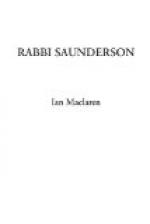Then the Rabbi turned on Carmichael his gentle eyes, that were shining with tears.
“It will be otherwise with you, and so let it be. May I live to see you rejoicing with the wife of your youth!”
So it came to pass that it was to this unlikely man Carmichael told his love for Kate Carnegie and what like Kate was, and he was amazed at the understanding of the Rabbi, as well as his sympathy and toleration.
“A maid of spirit—and that is an excellent thing; and any excess will be tamed by life. Only see to it that ye agree in that which lieth beneath all churches and maketh souls one in God. May He prosper you in your wooing as He did the patriarch Jacob, and far more abundantly!”
Very early in the morning Carmichael awoke, and being tempted by the sunrise, arose and went downstairs. As he came near the study door he heard a voice in prayer, and knew that the Rabbi had been all night in intercession.
“Thou hast denied me wife and child; deny me not Thyself. . . . A stranger Thou hast made me among men; refuse me not a place in the City. . . . Deal graciously with this lad who has been to me as a son in the Gospel. . . . He has not despised an old man; put not his heart to confusion. . . .”
Carmichael crept upstairs again, but not to sleep, and at breakfast he pledged the Rabbi to come up some day and see Kate Carnegie.
THE RABBI AS CONFESSOR
One day Carmichael, who had quarrelled with Kate over Mary Queen of Scots and had lost hope, came to a good resolution suddenly, and went down to see Rabbi Saunderson—the very thought of whose gentle, patient, selfless life was a rebuke and a tonic.
When two tramps held conference on the road, and one indicated to the other visibly that any gentleman in temporary distress would be treated after a Christian fashion at a neighbouring house, Carmichael, who had been walking in a dream since he passed the Lodge, knew instantly that he must be near the Free Kirk manse of Kilbogie. The means of communication between the members of the nomadic profession is almost perfect in its frequency and accuracy, and Saunderson’s manse was a hedge-side word. Not only did all the regular travellers by the north road call on their going up in spring and their coming down in autumn, but habitues of the east coast route were attracted and made a circuit to embrace so hospitable a home, and even country vagrants made their way from Dunleith and down through Glen Urtach to pay their respects to the Rabbi. They had particular directions to avoid Barbara—expressed in cypher on five different posts in the vicinity, and enforced in picturesque language, of an evening—and they were therefore careful to waylay the Rabbi on the road, or enter his study boldly from the front. The humbler members of the profession contented themselves with explaining that they had once been prosperous tradesmen, and were now walking to Muirtown in search of work—receiving their alms in silence, with diffidence and shame; but those in a higher walk came to consult the Rabbi on Bible difficulties, which were threatening to shake their faith, and departed much relieved—with a new view of Lot’s wife, as well as a suit of clothes the Rabbi had only worn three times.




